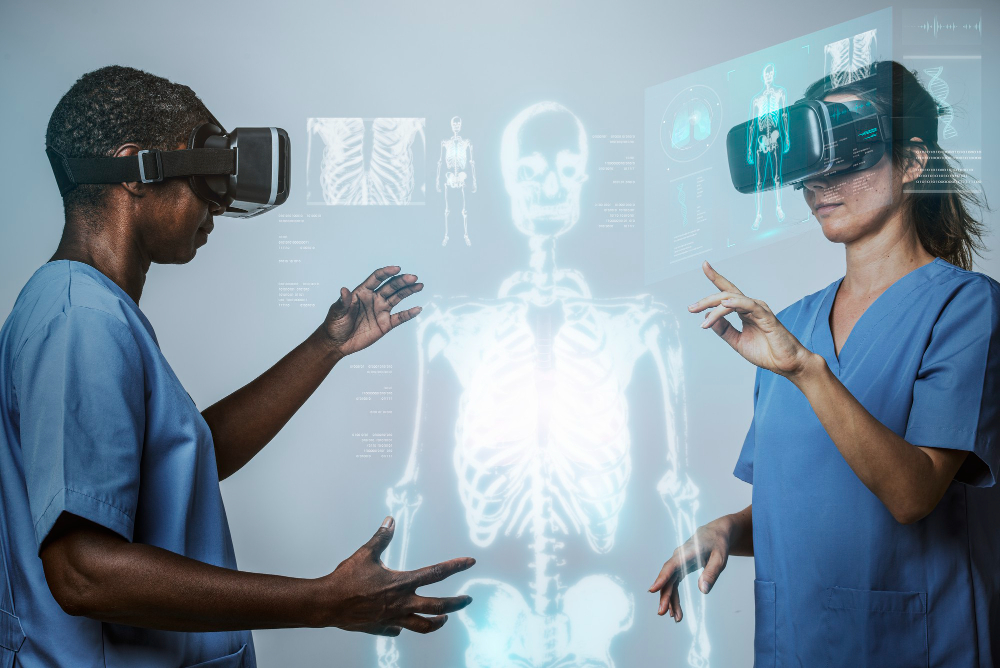Introduction
In recent years, AI has emerged as a transformative force in the medical field, revolutionizing the way healthcare services are delivered. This article explores the significant impact of AI in healthcare, its benefits, challenges, and future implications.
Understanding Artificial Intelligence in Healthcare
Definition and Overview
Artificial Intelligence refers to the simulation of human intelligence in machines, enabling them to perform tasks that would typically require human intelligence. In healthcare, AI systems analyze vast amounts of medical data, detect patterns, and make intelligent predictions to aid in diagnosis, treatment, and decision-making processes.
Applications of AI in Healthcare
AI finds applications in various areas of healthcare, including medical imaging analysis, drug discovery, electronic health records management, virtual assistants, and more. By leveraging machine learning algorithms, AI systems can assist healthcare professionals in making accurate diagnoses, developing personalized treatment plans, and improving overall patient care.
Advantages of Artificial Intelligence in Healthcare
Enhanced Diagnostic Accuracy
AI algorithms excel at analyzing medical images, such as X-rays, CT scans, and MRIs, with high precision and accuracy. By identifying subtle patterns or anomalies that may be overlooked by human eyes, AI systems can assist radiologists and other healthcare professionals in detecting diseases at an early stage, leading to better treatment outcomes.
Streamlined Administrative Tasks
In addition to clinical applications, AI also simplifies administrative tasks in healthcare settings. AI-powered chatbots can handle routine patient inquiries, appointment scheduling, and basic health advice, freeing up administrative staff to focus on more critical responsibilities. This automation improves efficiency, reduces waiting times, and enhances the overall patient experience.
Personalized Treatment Plans
AI-driven systems can analyze vast amounts of patient data, including medical history, genetics, lifestyle factors, and treatment outcomes, to develop personalized treatment plans. By considering individual variations and predicting treatment responses, AI enables healthcare professionals to deliver targeted therapies, resulting in better patient outcomes and improved healthcare efficacy.

Challenges and Limitations
Data Privacy and Security Concerns
Healthcare organizations must ensure robust measures are in place to protect sensitive patient information from unauthorized access, breaches, and misuse.
Ethical Considerations
The use of AI in healthcare raises ethical considerations, such as the responsible handling of patient data, ensuring fairness in algorithmic decision-making, and addressing potential biases in AI systems. Striking a balance between innovation and ethics is crucial to ensure patient trust and maintain the integrity of healthcare practices.
Integration and Acceptance
Integrating AI into existing healthcare systems and workflows can pose challenges. Healthcare professionals may require additional training and education to effectively utilize AI tools. Additionally, gaining acceptance and trust from Healthcare Email List providers, patients, and regulatory bodies is essential for the widespread adoption of AI in healthcare.
Current and Potential Use Cases of AI in Healthcare
Medical Imaging and Diagnostics
AI has shown remarkable capabilities in analyzing medical images, aiding in the accurate and timely diagnosis of various conditions, including cancer, cardiovascular diseases, and neurological disorders. By assisting radiologists in identifying subtle patterns and anomalies, AI improves diagnostic accuracy and expedites the treatment process.
Drug Discovery and Development
The process of discovering and developing new drugs is time-consuming and expensive. AI accelerates this process by analyzing vast amounts of biomedical data, predicting drug-target interactions, and simulating drug responses. AI-driven approaches help identify potential therapeutic targets, design novel drug candidates, and optimize drug efficacy.
Virtual Assistants and Chatbots
AI-powered virtual assistants and chatbots are transforming patient interactions and improving access to healthcare services. These virtual agents can provide personalized medical information, answer common health-related queries, and offer guidance on symptom management, medication reminders, and lifestyle recommendations.
Remote Patient Monitoring
AI-enabled remote patient monitoring devices and wearable allow healthcare providers to collect real-time patient data outside traditional healthcare settings. These devices can monitor vital signs, detect abnormalities, and provide continuous data streams for analysis. Remote patient monitoring enhances patient convenience, reduces hospital visits, and enables early intervention in critical situations.
Precision Medicine
Precision medicine aims to provide tailored treatments based on an individual’s unique genetic makeup, lifestyle factors, and medical history. AI plays a crucial role in analyzing complex genomic data, identifying biomarkers, and predicting treatment responses. By facilitating personalized treatment plans, AI contributes to more effective and targeted healthcare interventions.
The Future of AI in Healthcare
Predictive Analytics and Preventive Care
AI’s predictive capabilities can be harnessed to identify patterns and risk factors for various diseases. By analyzing patient data, lifestyle factors, and population health trends, AI algorithms can help predict disease outbreaks, epidemics, and individual health risks. This enables proactive interventions, preventive care strategies, and targeted public health initiatives.
Robotics and Surgical Automation
AI-driven robotics and surgical automation systems have the potential to enhance surgical precision, efficiency, and patient safety. Surgical robots can assist surgeons in complex procedures, providing enhanced visualization, precision control, and minimally invasive techniques. This technology reduces the risk of human error, shortens recovery times, and improves surgical outcomes.
AI-Enabled Clinical Decision Support Systems
Clinical decision support systems powered by AI can analyze patient data, medical literature, and treatment guidelines to provide evidence-based recommendations to healthcare providers. By integrating patient-specific information and up-to-date medical knowledge, these systems assist clinicians in making informed decisions, ensuring accurate diagnoses, and optimizing treatment plans.
Telemedicine and Remote Healthcare Delivery
The COVID-19 pandemic highlighted the significance of telemedicine and remote healthcare delivery. AI will play a crucial role in advancing these fields further. AI-powered telemedicine platforms can enable remote consultations, virtual monitoring, and diagnosis through video calls, chatbots, and remote medical devices. This allows patients to receive timely healthcare services regardless of geographical barriers.
Implications for Healthcare Professionals
Collaboration between AI and Healthcare Providers
The integration of AI in healthcare does not replace healthcare professionals but rather enhances their capabilities. Collaboration between AI systems and healthcare providers is essential to leverage the benefits of AI technology effectively. Healthcare professionals should embrace AI as a supportive tool and continually update their skills to work synergistically with AI systems.
Skill Enhancement and Training
Healthcare professionals will need to acquire new skills and competencies to effectively use AI tools and systems. Training programs should be developed to educate healthcare providers on AI technologies, data analytics, and ethical considerations. Continuous learning and upskilling will be essential to keep pace with the evolving landscape of AI in healthcare.
Redefining Roles and Responsibilities
The introduction of AI in healthcare will redefine the roles and responsibilities of healthcare professionals. While AI systems can assist in tasks such as diagnosis and decision-making, healthcare professionals will focus more on patient care, critical thinking, and complex problem-solving. The collaborative relationship between AI and healthcare providers will shape the future of healthcare delivery.
Addressing Concerns and Building Trust
Transparent and Explainable AI
To gain trust and acceptance, AI systems in healthcare should be transparent and explainable. It is crucial to develop algorithms that can provide clear explanations of their decision-making processes. This transparency helps healthcare professionals and patients understand how AI arrives at diagnoses or treatment recommendations, leading to increased trust and confidence.
Regulatory Frameworks and Standards
The ethical and legal aspects of AI in healthcare must be addressed through robust regulatory frameworks and standards. Regulatory bodies should establish guidelines for the development, deployment, and usage of AI systems in healthcare. These regulations should address issues such as data privacy, algorithmic transparency, and the ethical use of AI technology.
Ethical Considerations in AI-Driven Healthcare
Bias and Fairness
AI systems are prone to biases that can lead to discriminatory outcomes, particularly in healthcare. It is crucial to identify and address biases in data collection, algorithm design, and decision-making processes. Ensuring fairness in AI systems helps prevent disparities in healthcare delivery and promotes equitable access to medical services.
Accountability and Liability
With the increased reliance on AI systems, issues of accountability and liability arise. Determining responsibility in cases of AI-generated errors or adverse events can be challenging. Establishing clear guidelines and policies regarding accountability and liability is necessary to ensure appropriate usage, risk mitigation, and patient safety.
Informed Consent
The use of AI in the healthcare Industry requires informed consent from patients. Patients should be fully informed about how their data will be used, the potential benefits and risks of AI applications, and the safeguards in place to protect their privacy. Transparent communication and patient education are essential to obtain valid informed consent.
Conclusion
Artificial Intelligence is revolutionizing the healthcare industry, empowering healthcare professionals and improving patient outcomes. From enhanced diagnostics to personalized treatment plans and futuristic technologies, AI is reshaping the way healthcare services are delivered. However, challenges such as data privacy, ethical considerations, and integration hurdles must be addressed to fully harness the potential of AI in healthcare.

